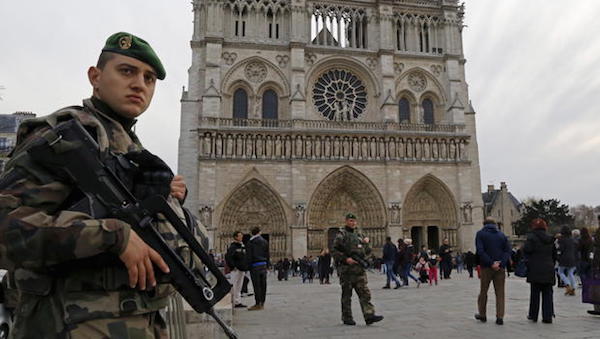


12/05/2017
The Washington Post reports from Europe that military troops assigned to protect the city streets from terror are “feeling the strain.” Apparently years of keeping Europeans safe from the terrorists which governments allowed to enter is taking its toll in terms of lost soldierly skills and general stress from the low-intensity civil war.
The Post front-paged its story with the now-traditional photo of a French soldier guarding the Eiffel Tower, which is seen as a prime target for hostile islam. The newspaper headline read, “In Europe, troops battle home-front burnout.”

European streets must be an extremely difficult place to protect when there are thousands of enemy jihadists who move among the innocent population. Christmas is coming, so that means increased targeting of by Muslims of churches and holiday celebrations for mass murder. In 2015, France fielded 120,000 police and soldiers over Christmas to protect French citizens from the hostile immigrants.
Soldiers guard Paris’ Notre Dame Cathedral because of danger from jihadists.

Lyon announced a couple days ago that it would cancel its famous Christmas market because of escalating security costs. A hijacked truck driven by a Tunisian failed asylum seeker attacked the Berlin Christmas market, killing 12 and injuring 48 last year.
The November 2015 multi-site attack in Paris killed 130 people, including 89 at the Bataclan theater, so the possibility of a huge death count is always a possibility in the minds of those responsible for safety.
And because demography is both cruel and insistent, Europe’s street warfare with Islam will only worsen. A recent Pew Research report titled “Europe’s Growing Muslim Population” noted that even if Islamic immigration were to end tomorrow, “the Muslim population of Europe still would be expected to rise from the current level of 4.9% to 7.4% by the year 2050.”
The Post report seems to be treading ever so carefully around the extent of the danger, the cause and the stressful effect on front-line troops.
The WP article was reprinted by MSN:
Soldiers guard Europe’s streets from terrorism. Critics say that weakens them in war. MSN, December 4, 2017(The Washington Post) Green army trucks are rumbling across the cobbled streets of Brussels. Stiff-spined soldiers are patrolling the Champs-Elysees in Paris. Italian troops are guarding the Colosseum. And critics say the years-long deployments at home are sapping the ability of these militaries to fight wars.
Taken together, the domestic deployments — to guard against terrorism — are among the largest in Western Europe since World War II. They come as European militaries are tapped to address an unusually wide range of challenges at once: a resurgent Russia, grinding conflicts in the Middle East, migration across the Mediterranean and smaller wartime deployments far from their borders.
Confronted by terrorism, European leaders rushed their armies onto their streets in the aftermath of attacks starting in 2015. Although advocates say the deployments help bolster security, the peacetime duty has stretched forces thin.
Until recently, 40 percent of Belgium’s fight-ready soldiers were devoted to domestic guard duty. Some officers worry that the lack of time to practice warfare means basic skills are getting rusty. In France, the former leader of the military said last month that he quit in July in part to protest that his forces were “overheating.”
President Trump has pressed NATO allies to commit more toward their own defense and to international missions, but the domestic deployments have made that a challenge. The latest sign came last month at a meeting of defense chiefs in Brussels, when the alliance fell short on pledges toward the NATO training operation in Afghanistan.
In Belgium, a country of 11 million people, military leaders say their troops are feeling the strain.
“I had machine gunners with the rifle section who didn’t fire a machine gun in 16 months because they had become riflemen,” said Maj. Gen. Marc Thys, commander of Belgium’s land forces. “It’s like asking our national team that hasn’t played a game of soccer all year to go to the world championships. It doesn’t work.”
Until October, 1,250 Belgian soldiers were deployed across the country, guarding grand boulevards, train stations and other crowded public places that make tempting targets. The intention was to increase public safety and to give police officers more freedom to do investigative work rather than tie them up on guard duty.
The domestic deployments came as European nations struggled to find a way to protect themselves against attacks in a new era of terrorism strategies. Some recent Islamic State-inspired strikes used explosives and required large networks that could be disrupted through aggressive counterterrorism work, but other attacks were as simple as renting a truck and plowing it into a crowd.